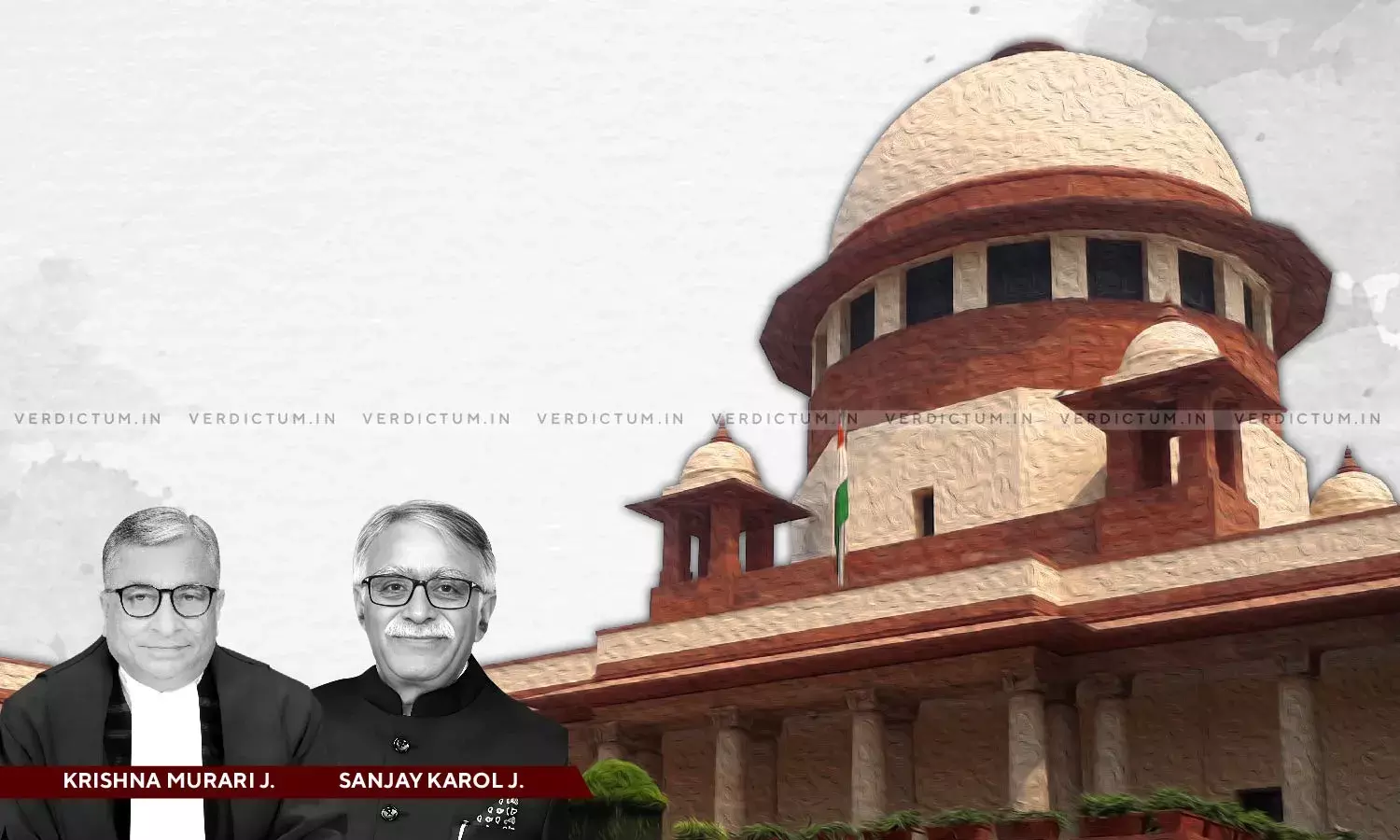Burden Of Proof Becomes Redundant In Seizure Cases Within Customs Area; Provision That Mandates Such Task Also Becomes Redundant- SC

The Supreme Court in a plea has observed that the question of burden of proof itself becomes redundant in cases of seizures within the customs area, by default, the provision that mandates such a task also becomes redundant.
While placing the matter before the Chief Justice of India for appropriate orders, the Court refrained from making any observations on the merits of the case and left the same for consideration by the Settlement Commission.
The Bench comprising Justice Krishna Murari and Justice Sanjay Karol said, “Since the discharge of burden proof, rather, the question of burden of proof itself becomes redundant in cases of seizures within the customs area, by default, the provision that mandates such a task also becomes redundant. In light of the abovementioned discussion therefore, in cases of seizure within the customs area, Section 123 of the Customs Act cannot apply and hence, the decision in the Suresh Judgement (Supra) passed by the High Court of Judicature at Bombay states the correct position of law. It must also be noted that the abovementioned decision of the High Court of Bombay was impugned in appeal before this Court, and vide order dated 14.09.2011, this Court had concurred with the decision of the High Court and dismissed the appeal of the revenue.”
The Court did not see any reason as to why a person cannot opt for a statutory remedy of settlement and therefore rejected the objection of the respondents in this regard.
However, Justice Sanjay Karol in his concurrent judgment said, “… the contention of the Petitioner that the legislative intent is for settlement of all cases cannot be accepted. … Since there is a recovery of goods to which Section 123 applies, the same is a bar for the Petitioner to approach the Settlement Commission. The matter, in my view, is fit to be remitted to the adjudicating authorities to take appropriate action, as per law.”
Advocate Ashish Batra represented the petitioner while ASG K.M. Nataraj represented the respondents.
Facts -
A writ petition was filed under Article 32 of the Constitution raising an issue of the huge importance of personal liberty under Article 21 regarding the right of an accused under the Customs Act, 1962 to settle the dispute as per provisions contained under Chapter XIV A of the Customs Act. The petitioner, who was an NRI was arrested at the Delhi International Airport and was alleged to have tried to smuggle high-value goods, mainly watches through the green channel entrance, in order to escape from paying duty on the same.
A detailed examination of the person and baggage of the petitioner was conducted on suspicion, and it resulted in the recovery of seven wrist watches, along with a few other high-value goods. The petitioner hence approached the Apex Court seeking the issuance of directions for permission for home-cooked food to be granted to him and contended that he was unable to travel outside India and was amenable to settle the dispute by approaching the settlement commission under Section 127 of the Customs Act, by paying the dues and interest to the customs department in accordance with the law.
The Supreme Court in view of the above facts noted, “By way of additional submissions made by the petitioner, it has been brought to our notice that the Commissioner of Customs has issued a show cause notice to the petitioner. Since a show cause notice has already been issued, no direction is that regard is warranted. If an application of settlement is filed by the petitioner, the same shall be dealt with by the Settlement Commission on its own merits and in accordance with law and the procedure prescribed u/s 127H of the Customs Act.”
The Court further asserted that if at all, the Settlement Commission would deem fit, it can always seek a further report from the “Commission (Investigation)” appointed within the Settlement Commission even after issuance of the show cause notice for such a one-time opportunity of settlement.
Justice Sanjay Karol in his separate judgment noted, “Even without any controversy about the origin of the goods, Section 127B of the Act would not apply for settlement in respect of the goods enumerated under Section 123 as this goes against the statutory scheme of penal consequences for committing certain offences such as for evading duty, as alleged in the present case, under Section 135. … Under the garb of relief purportedly relating to fundamental rights, the relief sought in the instant IA, is statutory in nature¬ under the Act i.e. for an application of settlement to be decided.”
He also said that recourse to the fundamental right to approach the Apex Court has to be permitted in cases where the fundamental rights of the petitioner have been infringed and that no such infringement is made out in this case as a result of which the same is liable to be dismissed on maintainability.
“… practice of circumventing the well-established principles for the exercise of the power of Article 32 should not be encouraged”, he concluded.
Accordingly, the Court disposed of the plea.
Cause Title- Yamal Manojbhai v. Union of India


